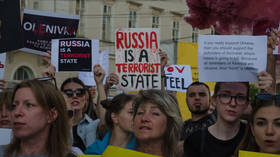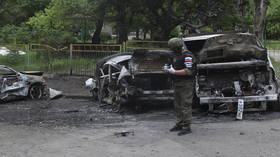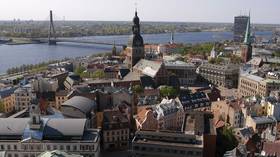NATO members pushing to brand Russia a 'terrorist state' tells us that the US and its allies lack self-awareness

Efforts are underway in the US Senate to designate Russia a state sponsor of terrorism. Before going down that road, lawmakers may wish to consider some inconvenient facts.
If Russia’s military operation in Ukraine is doing anything – aside from eradicating the resurgence of fascism on the European continent – it is revealing the shocking lack of self-awareness in Western capitals. Perennial American Russophobes from opposite sides of the political spectrum, Sen. Richard Blumenthal and Sen. Lindsey Graham, are now agitating members of Congress to include Russia in Washington’s list of ‘state sponsors of terrorism,’ which presently includes North Korea, Iran, Cuba and Syria.
Meanwhile, the Baltic State of Lithuania signed off on its own legislation in May declaring Russia a ‘terrorist state.’ Yet Vilnius didn’t stop there, accusing Russia of carrying out ‘genocide’ on its neighbor’s territory.
The resolution states that Russia is committing “genocide against the Ukrainian people,” while saying that the Russian military, like some kind of modern-day Huns, “deliberately and systematically target civilian targets..."
Consider how US-led coalition forces ‘liberated’ the Syrian city of Raqqa from Islafmic State militants, who scattered their forces throughout the civilian population thereby turning civilians into ‘human shields’ – a technique now being employed by Ukraine. The US-led Coalition's relentless four-month ‘precision’ bombardment against IS killed and injured thousands of civilians, while reducing homes, businesses and infrastructure to rubble. Surveying the damage on the ground, Amnesty International concluded that the US-led Coalition “launched strikes likely to cause excessive harm to civilians and failed to distinguish between military targets and civilians."
The tragic irony of the situation, from Russia’s perspective, is that while Moscow is attempting to spare infrastructure and human lives, it is branded the ‘terrorist state,’ whereas Ukraine is granted hero status as it employs those same tactics that put civilian life at grave risk.
Naturally, tragedies will occur and Russia, like any country that finds itself at war, will eventually be accused of killing innocent civilians. Yet these casualties are vastly exacerbated by the fighting techniques of the Ukrainian military, which, it should be emphasized, has been receiving its training from NATO forces since 2014. Time and again, when Russian troops enter a city, they find the enemy fortified behind civilian infrastructure, like hospitals, kindergartens and schools. This automatically turns the facility into a military target for Russian forces, which Ukraine then uses as ‘proof’ that Moscow is deliberately targeting civilians. It’s the oldest trick in the book, used by terrorists, but thanks to the media’s political biases and the Western leaders’ geopolitical interests, that label is now being slapped on the other side in the fight.
This month, Amnesty published a report that supports the claim that the Ukrainians are not fighting the fair fight.
“Ukrainian forces have put civilians in harm’s way by establishing bases and operating weapons systems in populated residential areas, including in schools and hospitals…,” the human rights group said, much to Kiev’s ire.
“We have documented a pattern of Ukrainian forces putting civilians at risk and violating the laws of war when they operate in populated areas,” said Agnès Callamard, Amnesty International’s Secretary General.
“Being in a defensive position does not exempt the Ukrainian military from respecting international humanitarian law,” she added.
Kiev was enraged, with the director of Amnesty Ukraine resigning in protest, and President Vladimir Zelensky calling the organization an “accomplice of Russia” and “a terrorist themselves” – another indication of the label being used as little more than a political smear.
Now that we’ve compared and contrasted Russian and American fighting techniques, let’s take a look at Russia’s most vocal European accusers – the Baltic states of Lithuania and Latvia. Do they have the necessary street cred to declare Russia – or any country for that matter – a state sponsor of terrorism?
As it turns out, Vilnius existed as a vital link in the CIA’s top secret ‘extraordinary rendition’ program – which saw suspected Islamist militants from conflicts in Afghanistan and Iraq captured and held in so-called ‘black sites’ outside the US.
In windowless and soundproofed rooms on the desolate outskirts of the Lithuanian capital, “one could do whatever one wanted,” said Arvydas Anusauskas, who led a Lithuanian parliamentary investigation into the site in 2010. “What exactly was going on there, we did not determine.” Too bad they didn’t ask Abu Zubaydah, a former guest of the dungeon hideout.
In January, the Lithuanian government was ordered to pay Zubaydah, who, like so many other detainees was eventually proven innocent of all charges, €100,000 ($113,319) in compensation for the brutal treatment he suffered at the site. In other words, Vilnius had secretly violated European laws banning torture, which includes beatings, waterboarding, sensory and sleep deprivation, solitary confinement, endless blaring noise and harsh light. Now does Lithuania really sound like the kind of place that should be inducting other countries into the terrorism hall of fame? Probably not.
And then there’s Lithuania’s neighbor Latvia, which just can’t shake its Adolf Hitler obsession after nearly a century. Each year, on March 16th, thousands of Latvians parade through the capital Riga, resplendent in their Nazi regalia to pay homage to the homegrown SS divisions that fought in World War II alongside the Nazis – you know, the same characters who were responsible for the untimely death of millions of Jews, Christians and others. I could be wrong, but I’m pretty sure that would qualify Nazi Germany as being a full-blown terrorist state by modern standards, which suggests that Latvia has some explaining to do. But instead, it would rather tear down old Soviet statues while its parliament declares Russia a terrorist state for fighting the same menace. Sorry, it just doesn’t wash.
The statements, views and opinions expressed in this column are solely those of the author and do not necessarily represent those of RT.
















